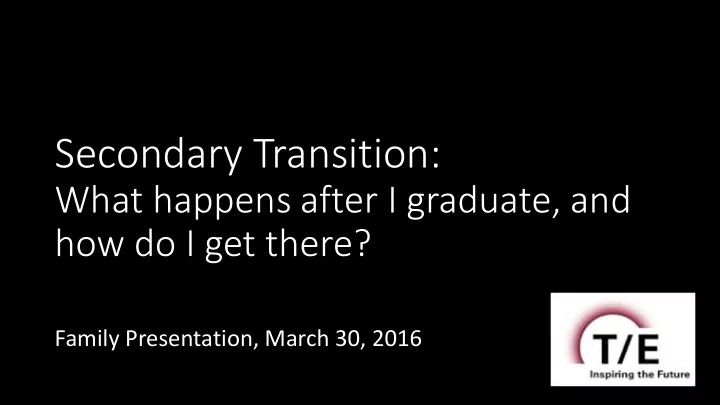

Secondary Transition: What happens after I graduate, and how do I get there? Family Presentation, March 30, 2016
Secondary transition: what is it? • Secondary transition is a bridge to your life after school- age services end. It is a process embedded within the IEP. • School-age services may go to age 21 if the IEP team agrees. • Planning must begin during the time the student turns 14. • Planning can encompass three areas: • Higher education and/or training • Employment • Independent living
The transition may feel like this.
Presenters this evening • Jenn Kratsa, Conestoga HS: College path and having an IEP • Michelle Macluckie, CCIU: Career & Technical Education programming • Lisa Tzanakis & Laurie Masino, CCIU: Community- based instruction • Shanae Stallworth, Office of Vocational Rehabilitation
What we want the process to feel like.
Planning for the Future Checklist • Developed by the Pennsylvania Department of Education to assist youth with disabilities in reviewing all aspects of transition planning. • It is individualized; not all items pertain to all students.
“There is no IEP in college.” IDEA ADA Type of Law Entitlement, Education statute Access/eligibility, Civil rights statue Who is responsible? School Student (not parent) What does the law ensure? An IEP designed to meet student Access by the student to needs accommodations What services & supports are Evaluation, remediation, Reasonable accommodations obligated to be present? accommodations From: Jane Thierfield Brown, Ed.D. Assistant Clinical Professor, Yale Child Study Disability Coordinator, U Conn Law School
College path and students with IEPs • Jenn Kratsa, Conestoga High School • Process of applying to college not different for students with an IEP • Always best practice to work hard in school & get involved • College testing process – ACT / SAT • During each IEP meeting, discussion about future plans • Junior year – a time for visiting / researching schools… remember to visit the Offices for Students with Disabilities • Senior year – the process will look the same for each student • After you receive your acceptances, it is time to review the IEP with the Office for Students with Disabilities
Career and Technical Education • Technical College High Schools (Pickering & Brandywine): Michelle Macluckie, CCIU • Hands on learning in a wide variety of programs • Transitional support through career assessment, program exploration, development of employability skills, and opportunities for dual enrollment. • TCHS Pickering: http://www.cciu.org/Page/788
Community-based instruction • Laurie Masino & Lisa Tzanakis, CCIU • http://www.cciu.org/page/500 • High school age options. IEP team decision as to student participation. • Pre-vocational exploration through CCIU Discover program. Pre- vocational assessment is conducted to determine eligibility. • Vocational exploration occurs in the community during the school day. • Travel training support: for students who require instruction and practice in safely traveling in the community with independence.
Community-based instruction • Post-12 th grade programs for some students (ages 18-21). IEP team decision as to student participation. • Transition Living Program (TLP): students learn and practice independent living skills using an apartment in West Chester during the day. • Transition to Work Program (TWP): focus on developing pre- vocational skills in the community, while partnering with TCHS • ASPIRE: for students with autism with a desire to attend college. Partnership with West Chester University • Project Search: final year of school-age eligibility, collaboration between Phoenixville Hospital, CCIU, OVR, MH/IDD and Kencrest.
Office of Vocational Rehabilitation (OVR) • Shanae Stallworth • Students close to reaching the end of their school age services may be eligible. OVR provides support for individuals with disabilities in obtaining employment. • If your student is connected with OVR and has a caseworker please let us know so we may invite them to IEP meetings. • http://www.portal.state.pa.us/portal/server.pt/community /vocational_rehabilitation/10356 •
Other agencies • If you are connected with an agency, please invite them to your IEP meetings. • Chester County Mental Health/Intellectual Developmental Disabilities (MH/IDD) • Bureau of Autism Services • Social Security
Recommend
More recommend